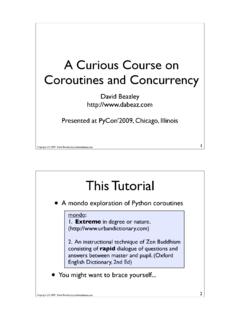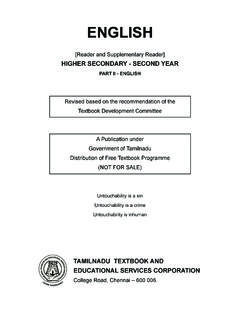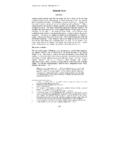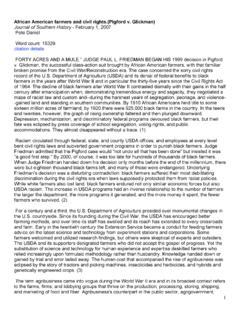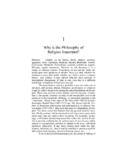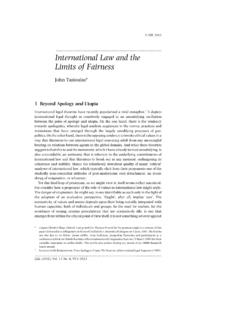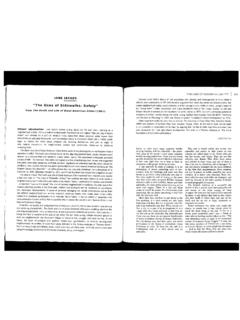Transcription of CURRENT THEOLOGICAL PROBLEMS WHICH …
1 CURRENT THEOLOGICAL PROBLEMS WHICH confront OUR CHURCH The purpose of this study is to point up and assess certain THEOLOGICAL positions WHICH threaten our Church. The assignment has been specific. I am to tackle three PROBLEMS . 1. problem I deals with the doctrine of Script- ure. Our doctrine of Scripture WHICH is derived from the claims of Scripture itself and WHICH has been articulated by the Church Fathers, Luther and Lu- theran Orthodoxy is no longer a viable position for the over-whelming number of theologians outside our fellowship. Our doctrine of the nature and authority and power of Scripture is simply rejected .2. problem I1 deals with the histor- ico-critical method. Theologians today in reading and inte~preting Scripture are commonly employing a method WHICH is not compatible with our doctrine of Scripture, and yet to varying degrees the method is employed by us.
2 3. problem I11 deals with the Ecumenical Movement. This great movement assumes a doctrine of the Church and of Church fellowship WHICH differs from our historic position. The present study will attempt to describe and analyze the broad move- ments WHICH must be included under the three PROBLEMS listed above. Seeing these movements as dangers the study will attempt to criticize them; it will be frankly polemical (this I understand to be in the nature of my assignment), I therefore have no interest in marking out various possible "insights" WHICH may be apparent in these movements. In fact, it is hardly possible to recog- nize a contribution or insight of a particular system, until the system itself is grasped in the light of its origins, presuppositions and purposes.
3 My method, then, will be to describe each movement as something synthetic, as a system, WHICH is based on certain definite postulates, WHICH has its own Sitz im Leben, --- and WHICH directs itself toward various definite goals. That any movement, whether philosophical or THEOLOGICAL (say, Logical Positivism, Pragmatism, or modern Biblical Theology), is purely a method is a totally false assumption, as I hope to demonstrate in the course of this study. THE DOCTRINE OF SCRIPTURE problem I The Lutheran doctrine of Scripture begins with the fact that the Sacred Scriptures are truly (vere et proprie) the Word of God, the product of His breath (2 Tim. 3:16). It is not necessary for me at this time to illustrate that this is the claim of the Scriptures and of our Lord Himself; but I do feel it incumbent upon me to stress what is meant by and involved in the statement, Scripture is the Word of God.
4 In the seventeenth century a battle for verbal inspiration was fought. Since that time orthodox theology has spoken of the content and the very words of Scripture as being Verbal in- spiration, however, is in danger of becoming a shibboleth today (when theo- logians such as Karl Earth and John Baillie use the terminology), unless we recognize and carry out the practical, necessary and Biblical corollaries of the doctrine, viz. that Scripture WHICH is the written Word of God carries with it the power, the truthfulness and the authority of very God. This is most im- portant: all the so-called properties of Scripture (however the theologians may list them) are predicated on its divine origin (Cf.)
5 2 Tim, 3~15-17). A, THE AUTHORITY OF SCRIPTURE Let us at this point address specifically to the mat,ter of Script- authority-. Believing to be God's Word, we have taught that Scripture .'l s our THEOLOGICAL principium cognoscendi -- . It is "the only rule and norm according to WHICH all doctrines and teac,laers aiike must be appraised and judged" (Formula of Concord, Epit, Zr I.), The authority. of Scripture is the au- thority of God speaking, This normative authority ( ) of Scripture has for some two hundred years now been questioned the Christian And today with greater force than before is at us: :is the sola - - scriptura principle as it was articulated by Luther and the Lutheran Confessions any longer tenable, when a scientific world view and science have imposed themselves upon the Christian Church?
6 That is to say, can we stay any longer with the very words of Scr:iptu:re and build our doctrine on these alone, as was the practice of Christ and the apostles in their use of the Old Testament ? Our answer will be prompt and unabashed. But we must bear mind that many who speak loudly about the authority of the Scriptures are in fact equivocating and corrupting the , and this because they have in most cases abandoned the of 's , ~iz. the doctrine that Scripture is the Word of God. In modern Protestant I have found the only. exception in this matter to be Werner Elert, I now simply. sketch in broadest lines some of the modern approaches to Scripture WHICH the sola scriptura principle a One may discern that behind se approaches to - Scripture's authority lies in most cases an viz.
7 That in itself is not God's Word. 1, The scriptura principle is vitiated when the Chu-rcb is made a source of doctrine. This is of c,ourse , the of Rome, :h the apos- tolic letter of Leo XI11 (1902), entitled Vigilantlae, we are told, "The nature of -- the divine books is such that in order t,o dissipate the rellgiou.~ obscurity with WHICH they are shrouded we must never count on the la\ws of hermeneutics, but must address ours elves to Church, WHICH has beear given by. God to mankind as a guide and teacher," We can see that when the Roman Church, becomes a sine qua non for reading and understanding , the has been e s- ---, - tablished as a source of theology in addition to Sc:r:ipture.
8 The Roman Church, however, insists on doctrine of verbal Inspiration and inerrancy. 2. The Scripture is vitiated when the Christian kerygma is made a of doctrine. This is the posit?.on of Heinrich , one time of Bultmana and now Roman Cathol.:lc" that the orig.':nal kerygma is the apostolic Word, that this kerygma is pr!.or both in time and intrinsically to the gospel accounts of Christ w; :)rt are bu. around the kery- gma . Thus, dogma (kerygma) is the basis of' Scripture, not Sc basis of dogma. The so-called regula f'idei. is not a pedagogic summary of Scripture - ---- as we have formerly thought, but it is the nucleus of the Scr:'; and the canon for interpreting them (Cf.
9 "Kerygma and Sophia, zur newtestament,-lichen Gra;.nd- des Dogmas1' in Evangelische - Theologie. ,-1, p. 48lFF)- This view, ---. ---. built upon Bultmann9s form criticism, leads to and confusion; for Scripture will always be our chief for determining the apostolic kerygma, and yet. here the kerygma becomes more fundamental than Scripture. The view assumes that Scripture as does not exhibit authoritative kerygma, We notice here a congeniality between form criticism a Bultmann and the Roman view concerning authority and dogma. We recall how made not Scripture but the articles of faith, the source of theology (Summa Theologica, I, --- - 2? 1)" 3, The Scripture principle :is when the material principle is sub- stituted for the formal principle of theology.
10 Such a substitution is subtly by both Barth and Brunner when they emphasize in contexts dealing with Scripture's authority that Christ is the Lord of Scripture (Barth,Church Dogmatics. I, 2, 513; -- Brunner, Revelation and Reason, ) and when in similar contexts they emphasize --- the of and its position as an account of WHICH . is alone divinely authoritative (Barth, 02; cit. , 462; Brunner, op. cit . , )- Following - - this lead Martin Heinecken says, Ghat is the Word of God and what is not the Word of God must be judged by the Word of God itself, i. e . in other words, it must be judged from the center of the message, i, e. from Christ" (The Voice, 43). We --. - see h,ere a confusion between the material principle is the source of our Christianity and tb-e formal WHICH is the source of our , The two ~ must not be pitted against each other as Heinecken does, but they- stand together.

